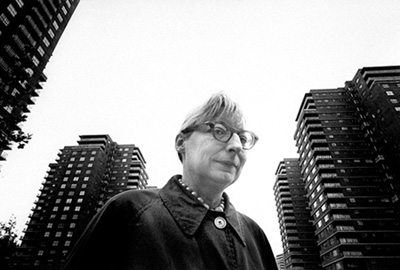genius of the week

jane jacobs
5.4.16-4.25.06
Jane Jacobs, was an American-born Canadian writer and activist. She is best known for The Death and Life of Great American Cities (1961), a powerful critique of the urban renewal policies of the 1950s in the United States. The book has been credited with reaching beyond planning issues to influence the spirit of the times. "Jacobs came down firmly on the side of spontaneous inventiveness of individuals, as against abstract plans imposed by governments and corporations," wrote Canadian critic Robert Fulford. She was an unlikely intellectual warrior, a theorist who opposed most theories, a teacher with no teaching job and no university degree, a writer who wrote well but infrequently.
Jane Butzner was born in Scranton, Pennsylvania, to a Jewish family in that overwhelmingly ethnic Catholic city, the daughter of a doctor and a former school teacher and nurse. After graduating from high school, she took an unpaid position as the assistant to the women's page editor at the Scranton Tribune. A year later, in the middle of the Great Depression, she left Scranton for New York City.
During her first several years in the city she held a variety of jobs, working mainly as a stenographer and freelance writer, often writing about working districts in the city. These experiences, she claims, "...gave me more of a notion of what was going on in the city and what business was like, what work was like." While working for the Office of War Information she met an architect named Robert Hyde Jacobs — her future husband.
She studied at Columbia University in the School of General Studies for two years, taking courses in geology, zoology, law, political science, and economics.
Opposing expressways and supporting neighborhoods were common themes in her life. In 1962, she was chairman of the Joint Committee to Stop the Lower Manhattan Expressway, when the downtown expressway plan was killed. She was again involved in stopping the Lower Manhattan Expressway, and was arrested during a demonstration on April 10, 1968. Jacobs opposed Robert Moses, who had already forced through the Cross-Bronx Expressway and other motorways against neighborhood opposition. A PBS documentary series on New York's history devoted a full hour of its fourteen-hour length strictly to the battle between Moses and Jacobs.
urban studies (2004 article in the new yorker)

